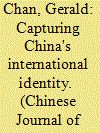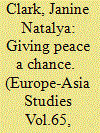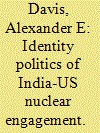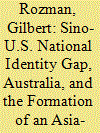| Srl | Item |
| 1 |
ID:
131999


|
|
|
|
|
| Publication |
2014.
|
| Summary/Abstract |
What is China's international identity? How has it changed over time, especially since the reform and opening up of the country in the late 1970s? How does China see itself? And how do other countries see China? I argue that answers to these questions are instrumental to a proper understanding of Chinese foreign-policy behaviour, in ways more significant than we normally assume. To advance this argument, I choose to examine China's social interactions with the outside world to ascertain the evolution of its international identity/identities. I shall trace the domestic sources of China's external policies. In so doing, I hope this article will elucidate the 'debates' between social constructivism and realism as to their relative explanatory power with respect to the making of Chinese international identity. I also hope it will throw light on a possible alternative framework, known as social evolution, for studying China's international relations and its evolving identities.
|
|
|
|
|
|
|
|
|
|
|
|
|
|
|
|
| 2 |
ID:
128740


|
|
|
|
|
| Publication |
2014.
|
| Summary/Abstract |
Despite highly favorable conditions for cooperation, South Korea and Japan have experienced almost constant diplomatic conflict since the end of the Cold War, in large part because of unresolved history disputes. Through the theoretical approach of symbolic politics, I examine the substance of these conflicts and the processes by which specific group identities affect policymaking in and the relationship between the two countries. Based on three case studies I suggest that diplomatic conflicts are the result of identity clashes between a group of Japanese conservative elites and the South Korean public, manifested through the elite-led process of symbolic politics in Japan and the mass-led process in South Korea. These findings help analysts understand the patterns that these conflicts exhibit and assess the prospects for future reconciliation between South Korea and Japan.
|
|
|
|
|
|
|
|
|
|
|
|
|
|
|
|
| 3 |
ID:
129463


|
|
|
|
|
| Publication |
2013.
|
| Summary/Abstract |
This article focuses on ex-combatants (branitelji) in the town of Vukovar. It argues that while veterans currently present an obstacle to inter-ethnic reconciliation, this need not be the case; they can potentially play an important role as peace builders. As a first step, however, they need to be reintegrated into society, and to a large extent this has not yet happened. The purpose of this article is thus to reflect on possible ways of advancing the reintegration process, focusing on the core themes of identity and trauma.
|
|
|
|
|
|
|
|
|
|
|
|
|
|
|
|
| 4 |
ID:
130876


|
|
|
|
|
| Publication |
2014.
|
| Summary/Abstract |
Although its precise definition is contested, the concept of the 'Anglosphere' has grown in political discourse in the past decade. Anglospherist authors have defined it as a group of states tied together on the basis of shared tradition, laws, liberty and language. And yet they do not discuss India substantively, placing it firmly on the outside of its hierarchy. Others have argued the concept is based in a racialised, Anglo-Saxon identity. In 2005, Manmohan Singh surprised some domestic observers by emphasising India's positive connections to the 'English-speaking world' while speaking at Oxford University. Shortly after, India announced negotiations on a civil nuclear agreement with the US, leading to similar agreements with Canada, the UK and Australia. This article uses the contemporary India-US nuclear engagement to investigate India's position in relation to the ideational space of the Anglosphere and how this shapes India-Anglosphere relations. It is argued that India's postcolonial scepticism towards this space combined with the inherent anglocentrism in Anglosphere identity discourse limits India-Anglosphere relations while simultaneously animating nuclear engagement.
|
|
|
|
|
|
|
|
|
|
|
|
|
|
|
|
| 5 |
ID:
130175


|
|
|
|
|
| Publication |
2014.
|
| Summary/Abstract |
Australia is a middle power caught between rising dependence on China, which seeks a sinocentric region, and growing security reliance on the U.S., which strives for a trans-Pacific community supporting universal values. In light of the Sino-U.S. identity gap and different concepts of regionalism, its response becomes clearer.
|
|
|
|
|
|
|
|
|
|
|
|
|
|
|
|